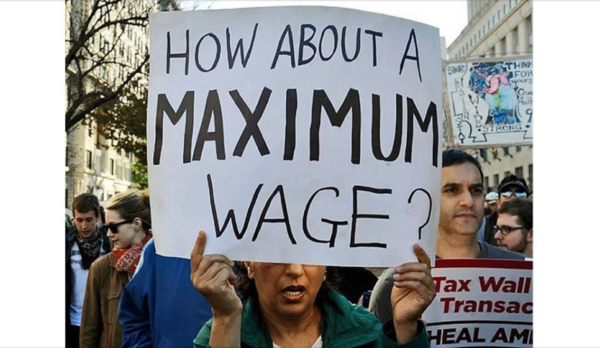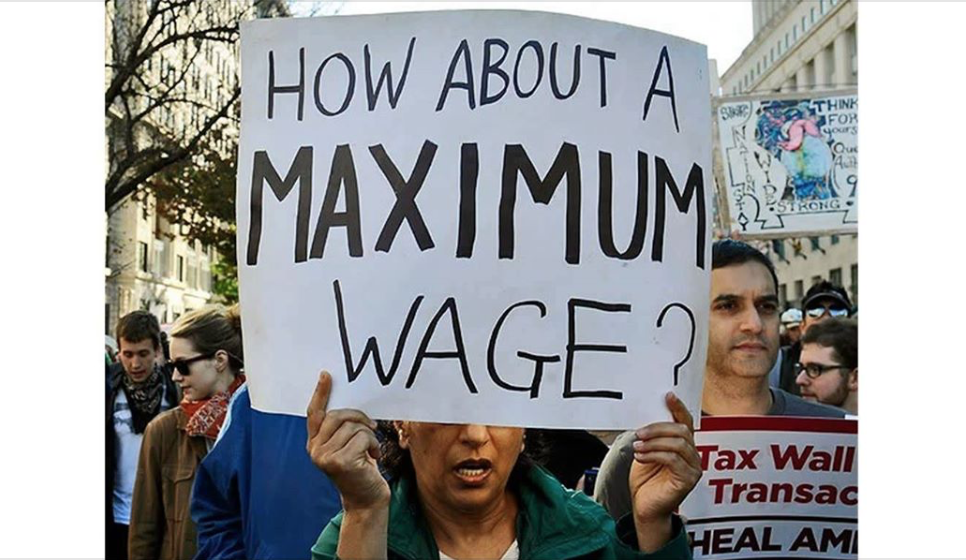
I’m really not a fan of the American Army, however there is one thing about it I do quite like. The top General is paid about 10 times the salary of a Private.
Not a 1000 times or 2000 times as some Corporations pay their CEOs.
When I was filming my documentary MIND THE GAP in 2102 about rising inequality in our country, Prof. Robert Wade of the London School of Economics proposed a very simple idea to me during his interview…..that we tie the minimum wage to a maximum wage.
The more top earners make the more they drag up the wages of those below.
Government could lead the way on promoting such worthwhile idea if they were really of a mind that ” being fair” was one of their core values.
What do you think?
Bryan Bruce is one of NZs most respected documentary makers and public intellectuals who has tirelessly exposed NZs neoliberal economic settings as the main cause for social issues.






A great idea… how about a maximum number of properties one person can own, i.e. one?
I agree with the principle Castro, although think making owning houses a bit higher so that we have rental supply since the state is not up to the job..maybe 2 or three and anything over that and more importantly in a company or trust name that is a property asset, should have a stamp duty and capital gain attached to it as well as a limit of 2 or 3 per director…
That way people’s consumption of property is contained and if they are in a company or trust name they are taxed as they buy and sell here… I’m not against people owning a small amount of rental properties because there is a shortage, but people’s ability to buy them should be limited to an amount per person and companies need a lot more taxes on them so they can stop money laundering and the world making gold bricks investments here.
We have a housing crisis which is local wages can’t afford housing and the government is turning and blind eye to the Marie Antoinette housing shortages aka massive construction of luxury apartments and housing here that many people who work here can’t afford to live in.
No one should “own” property.
State ownership of all land and resources has been the basis for many effective reforms.
You use a bit of land for a relatively short time then hand back in good condition.
Kirk explored this concept.Henry George laid out the benefits of community ownership and the dangers of private ownership that allow stratification of wealth based on this ownership.
Both Sun Yat Sen and Mao followed the principle with the former given kinder press by Western propagandists. China’s land reform was based oh Henry George’s work.
State owned land has a landlord that is answerable to the people.
Fair rent becomes a source of state income redirected back to community support.
There is no need to own land
John W, I agree that no-one should own land but there are a variety of ways to achieve that. I personally think that all land should be owned by the state on behalf of all Kiwis and an occupant rents the land on a 99 year lease.
When the occupant dies he can ‘will’ the lease to his family but the State can veto that option and choose another by auction. Any improvements would need approval and an agreed amount passed onto the descendants of the occupants.
Sounds like the Chinese system where nobody can own land but the state controls it… and I’m not sure that one power aka the state is better than individual ownership, in fact I’d say it seems worse!
Judgement on that may depend on whether you aim is to use land for living occupation including growing food and housing, or, if you have capitalistic motives of using land as a commodity to profit from by way of rent, sale or development.
Private developers have pushed the price of land beyond most young people today in NZ.
Land should never be a part of a market but a facility for all in our community.
Absolutely great idea and also part of management theory of the 1970’s which seems to be conveniently ignored…
“When it came to the relationship between a CEO’s pay and that of the average worker, Drucker advocated a ratio around 25 to 1 (as he suggested in a 1977 article) or 20 to 1 (as he expressed in a 1984 essay and several times thereafter). Widen the pay gap much beyond that, he said, and it makes it difficult to foster the kind of teamwork and trust that businesses need to succeed.
“I have often advised managers that a 20 to 1 salary ratio is the limit beyond which they can not go if they don’t want resentment and falling morale to hit their companies,” Drucker explained (At last year’s World Economic Forum in Davos, Switzerland, those looking to cap runaway CEO pay came to refer to the 20 to 1 mark as “the Drucker principle.”)
In a 2004 interview, Drucker elaborated further: “I’m not talking about the bitter feelings of the people on the plant floor… It’s the midlevel management that is incredibly disillusioned” by king size CEO compensation.”
https://blog.deming.org/2015/02/peter-drucker-advocated-a-ratio-of-20-to-1-for-ceo-to-average-worker-pay/
I also think that State owned companies and state employee’s and council and council controlled employee’s and executives should earn less than the Prime minister (who apparently is paid more highly than other nation’s prime ministers like Canada and the UK and only slightly under the US president)…and actually the PM should take a pay cut to UK levels.
Seems like in NZ we are at the top of executive salaries but everyone else (lowest and middle management workers) tend to have to take a hair cut to support the avarice and glass ceilings at the top.
In fact it seems well paid executives in NZ often precede over lowering of customer service levels as well as making massive redundancies to ‘justify’ their massive salaries… and then eventually massive losses, then the governments wonder why NZ productivity is so low and we can’t grow any businesses here… and struggle to keep skilled Kiwi’s in the country…
Look at the underwhelming Fonterra CEO Theo Spierings paid $8.32m (57% jump from 2016) in 2017… pretty much run a formally top ranked company into the ground lowering profits, and having appalling investments like China’s Beingmate. Fonterra shareholders have seen the value of that stake almost halve over the past two and a half years – in excess of $300 million. The shares Mr Spierings purchased at CNY18.00 are now trading at just 9.90 and sinking.”
Former Sky City CEO Nigel Morrison received $6.4m in 2016, but that was made up of a base salary plus dividends and leave entitlements, while former Fletcher Building CEO Mark Adamson was given $4.7m.
Fletcher has been hit by losses https://www.stuff.co.nz/business/property/95821940/fletcher-building-reveals-292m-loss-within-construction-arm https://www.stuff.co.nz/business/101411661/fletcher-building-to-reveal-new-construction-losses, so it seems that having greedy executive salaries seem to incentivise greedy and naive people rather than responsible decision making.
So nope, NZ obsession with paying apparently ‘world class’ salaries at the top seem to create the opposite, dysfunctional poorly run companies here. Could be time to think about the Drucker principle…
Don’t forget Solid energy going under, Kiwirail and transport companies are dysfunction and produce pathetic outcomes, and our many under performing companies here with well paid executives, seem to go against the neoliberal mantras that greed is good….
5 to 10 times the basic wage would provide a guide for the money but credit or Mana earned could be an additional motivation.
Mana earned based on social or community outcomes not profit or dirty dividends.
The 5 – 10 times guide is used in many Italian co-operatives.
Job satisfaction and peer recognition is built in with employee participation in workplace planning, management and innovation. Shared profits and social support helps to bind employees also.
When enterprises grow past a size where social cohesion is affected the corruption seems to result.
Comments are closed.